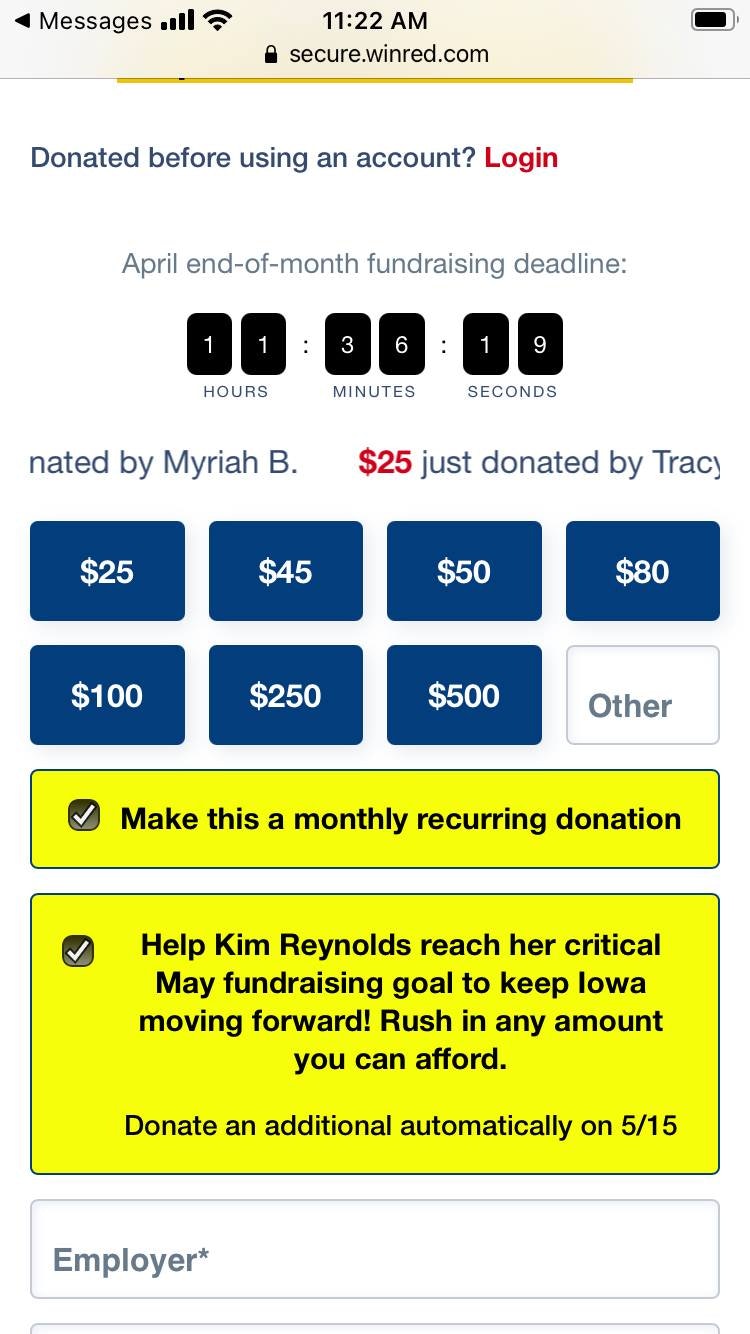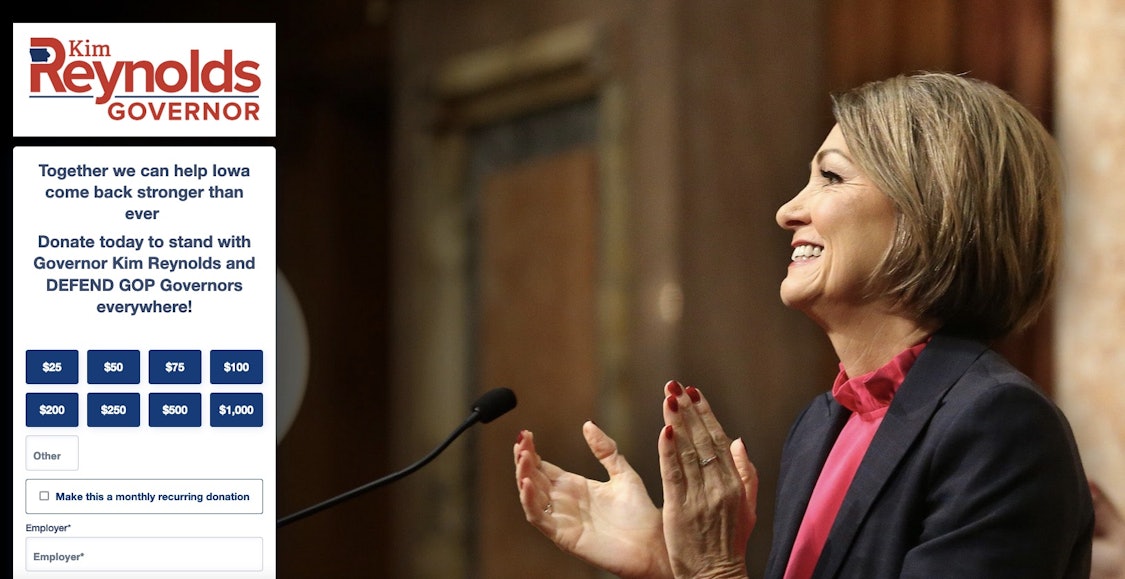The Iowa Ethics and Campaign Disclosure Board has asked state lawmakers to approve a bill requiring donors to opt in to recurring contributions to Iowa candidates or political committees.
The agency charged with enforcing Iowa’s campaign regulations pre-filed the bill last month, after the six-member board unanimously voted to recommend the policy at its November meeting.
Under the proposal:
- Campaign solicitations would need to require “affirmative consent” from the donor making the recurring contribution. The bill clarifies that “affirmative consent” does “not include passive action” like “failing to uncheck a prechecked box authorizing a recurring contribution.”
- Campaigns would be prohibited from accepting recurring contributions without receiving affirmative consent at the time of the initial donation.
- Campaigns would be required to cancel recurring contributions at the donor’s request.
- Campaigns that received a recurring contribution without affirmative consent would be required to refund the donation.
- Campaigns would be required to cancel recurring contributions at the donor’s request.
- Campaigns would be prohibited from accepting recurring contributions without receiving affirmative consent at the time of the initial donation.
A SAFEGUARD AGAINST “UNSCRUPULOUS” POLITICAL FUNDRAISING
In a memo to lawmakers, the ethics board’s executive director Zach Goodrich explained that the regulations “will protect contributors from unscrupulous fundraising tactics.” The use of pre-checked boxes for online donations can lead “unsuspecting contributors” to make a recurring contribution when they intended to make a one-time gift. “These recurring contributions, some of which happen as frequently as every week, can be difficult to cancel once discovered.”
The Federal Election Commission unanimously recommended that Congress regulate recurring contributions in 2021, after receiving numerous complaints about how President Donald Trump’s campaign used the tactic in 2020.
Congress did not act on the FEC’s request. But in 2022, California became the first state to require affirmative consent for recurring campaign contributions. Goodrich noted in his memo to lawmakers that the bill moved through California’s legislature “without a single dissenting vote” before Governor Gavin Newsom signed it into law.
“LET IOWA LEAD THE COUNTRY ON THIS”
Several Iowa elected officials began opting online donors into recurring campaign contributions during the first half of 2021. U.S. Representatives Ashley Hinson and Mariannette Miller-Meeks hold federal offices, so their campaign activities fall under the FEC’s jurisdiction.
Governor Kim Reynolds was the first (and to my knowledge the only) Iowa candidate for a state office who has used pre-checked donation boxes. Her campaign introduced the tactic in April 2021. For much of that year, online solicitations led would-be donors to pages with two boxes pre-checked. One authorized a monthly contribution to the Reynolds campaign, and the other defaulted donors into an extra “money bomb” on a particular date in the near future. Bleeding Heartland saved these screenshots in 2021, as well as the image at the top of this post.


In August 2021, the ethics board’s executive director Mike Marshall told Bleeding Heartland that Iowa’s campaign regulator had not received any complaints about recurring donations. In the absence of objections from the public, board members felt pre-checked donation boxes were not “ripe for the board to expend its very limited political capital” on as part of the agency’s legislative agenda, he said.
It was a different story at the board’s latest meeting in November 2022. Goodrich described the rationale for the proposal to prevent “predatory contribution practices.” He said he had seen examples in another state where a federal candidate had three boxes pre-checked on a donation form. He mentioned the FEC’s recommendation as well as California’s new law.
The six ethics board members—three Republicans, two Democrats, and an independent, four appointed by Reynolds and two by Governor Terry Branstad—quickly embraced the idea. “Let Iowa lead the country on this,” longtime board chair James Albert commented. He noted that the Iowa Ethics and Campaign Disclosure Board “was a Watergate reform agency” and will soon celebrate its 50th anniversary.
The board then cast what Albert described as “an enthusiastic unanimous vote” to include this proposal on the agency’s 2023 legislative agenda.
Goodrich told Bleeding Heartland via email in December that the board had not received any complaints during the last election cycle about Iowa campaigns opting supporters into recurring donations. “I think it’s fair to characterize this bill as proactive to ensure this doesn’t become a problem with Iowa committees.” He explained,
Right now, committees are under no obligation to honor a request to cancel a recurring contribution, let alone return a contribution that was made unbeknownst to the contributor. We want to protect those who donate and ensure committees solicit/raise funds with integrity – just as our agency’s mission statement says “to promote the public’s trust and confidence in government by ensuring the integrity of political campaigns…”
PROSPECTS IN STATE LEGISLATURE UNCLEAR
Bills related to elections are typically referred to the Iowa legislature’s State Government committees. The Republicans who are slated to chair those panels this year, State Representative Jane Bloomingdale and State Senator Jason Schultz, did not respond to Bleeding Heartland’s inquiries about whether they would take up the ethics board’s proposal on recurring campaign contributions.
Iowa House and Senate committees are not required to act on bills recommended by state government agencies.
At this writing, the Kim Reynolds campaign no longer opts supporters into a monthly donation or an extra “money bomb” at a future date. Rather, supporters can choose to check a box to make a recurring gift. Here is how the campaign’s website donation page appeared on a computer when loaded on January 5:

Here is the same page, as loaded on a cell phone January 5:

Similarly, the online donation pages for Hinson and Miller-Meeks now offer the option of a recurring donation, without automatically checking that box.
Editor’s note: This post has been corrected to note that four of the six Iowa Ethics and Campaign Disclosure Board members were appointed by Governor Kim Reynolds.


1 Comment
Common Sense Reform!
In my opinion, anyone in the legislature or governor’s office who is against this law effectively endorses this sleazy practice. I’m liking all the recent news I’ve seen from this agency that you’ve covered… its a rare bright spot in our state government. God knows we need some more ethics to fight this GOP controlled government!!!
RayRepublican1962 Tue 10 Jan 3:57 PM